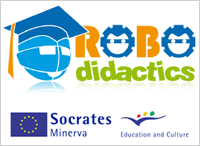EC Robo-Didactics Project
 The European Project RoboDidactics was a Socrates Project funded by the European Commission (1 October 2006 - September 30 2008, 229655-CP-1-2006-1-IT-MINERVA-M 2006-2416/001-001 SO2). It had nine partners in six European Countries. The School of Robotics was one of them.
The European Project RoboDidactics was a Socrates Project funded by the European Commission (1 October 2006 - September 30 2008, 229655-CP-1-2006-1-IT-MINERVA-M 2006-2416/001-001 SO2). It had nine partners in six European Countries. The School of Robotics was one of them.
It aimed at creating an European methodology for introducing robotics in didactics in order to advance teaching and learning processes of scientific and ICT-oriented subjects which are today critical for equipping young generations of students with a set of skills that is increasingly required by the job market.
Robo-Didactics understood robotics as a cut-across curricular discipline encapsulating a great potential for the renaissance of traditional teaching and learning strategies applied to scientific subjects in schools. Yet, today, this inter-disciplinary didactic potential of robotics for education is largely unexploited.
Thus, if we look at the majority of national educational plans in Europe, it is quite hard to identify a European-based strategy to introduce Robotics and Control technology in the official curricula. Some countries have done so on their own such as the United Kingdom.. More activity is found at school level, for instance, schools from several EU countries take part in the various national and international RoboCup competitions with interesting results and achievements. However, these schools represent a small grouping if compared with the thousands of schools across Europe. Furthermore these competitions reveal other two relevant aspects:
- the majority of the participating schools are from vocational technical institutes, suggesting that this robotics is still seen as a “sectorial” field
- there is a strong propensity to introduce robotics only at the upper-secondary level, leaving other school levels scarcely represented
Ultimately, we are missing a holistic approach that rather than considering robotics as a technical discipline it considers it as an educational methodology whose benefits are spread through the whole students’ curriculum at all levels.
From the eighties onwards we have witnessed a growing trend in the fall of interest among youngsters towards vocational studies in scientific subjects. This phenomenon, originally started in the United States of America, has quickly spread to all industrialised countries. Not by chance, all European educational systems, both at national and international level, have been experiencing slight negative rates of subscription to scientific-oriented schools and universities by students choosing their vocational studies.
Just as a matter of example, looking at application rates to scientific universities in Italy over the last half century we can see how the rate has fallen from nearly 50% in 1950 to 30% at the beginnings of 2000. Clearly this situation has a wide impact in terms of reduction of specialised human capital, thus enlarging the existing skill shortage in some of the most critical sectors for the economic growth of the European Union.
No doubt that the Lisbon strategy to make of Europe the most competitive knowledge-based economy in the world will remain a long-cherished ideal if European educational systems do not transform effectively in terms of tools, infrastructure and didactical strategies for teaching and learning in the 21st century.


